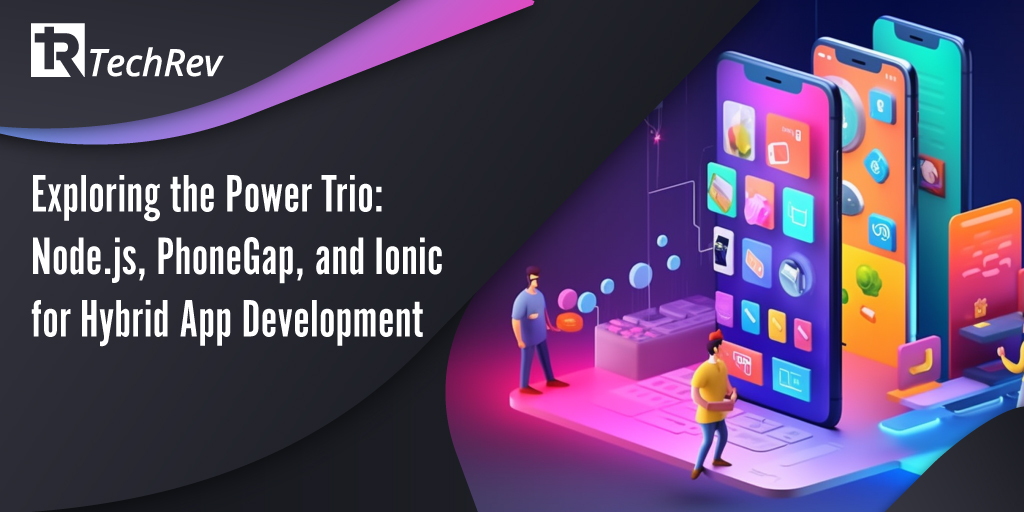
The demand for versatile solutions has led to the rise of hybrid app development. Hybrid apps combine the best of both worlds for businesses. Every enterprise can have the performance of native apps and the flexibility of web apps. When choosing the right programming languages for creating hybrid apps, three names stand out: Node.js, PhoneGap, and Ionic. In this blog, we’ll delve into the strengths of these popular programming languages and understand why they are the go-to choices for developers in the hybrid app development sphere.
Node.js: The Backbone of Hybrid App Development
Node.js, built on the Chrome V8 JavaScript runtime, has gained immense popularity for its ability to enable server-side and networking applications. In the context of hybrid app development, Node.js shines as it allows developers to use JavaScript for both server-side and client-side scripting. This uniformity simplifies the development process and facilitates seamless communication between the server and the client.
Key Features of Node.js for Hybrid App Development:
- Single Language:
Using JavaScript on both the server and client sides promotes consistency in coding, making it easier for developers to work on the entire stack.
- Efficient Handling of Concurrent Requests:
Node.js employs an event-driven, non-blocking I/O model, ensuring efficient handling of concurrent requests – a crucial aspect for responsive and high-performance hybrid apps.
- Extensive Package Ecosystem:
Node Package Manager (NPM) offers a vast collection of open-source libraries, making it convenient for developers to integrate functionalities into their hybrid apps.
PhoneGap (Apache Cordova): Bridging the Gap
PhoneGap, now known as Apache Cordova, is a mobile app development framework that utilizes standard web technologies (HTML5, CSS3, and JavaScript) to build cross-platform apps. Its strength lies in bridging the gap between web and native development, allowing developers to create apps that can run on multiple platforms with a single codebase.
Key Features of PhoneGap for Hybrid App Development:
- Cross-Platform Compatibility:
PhoneGap facilitates the development of cross-platform apps, eliminating the need to rewrite code for different operating systems. A single codebase can be used for iOS, Android, and other platforms.
- Access to Native Device Features:
Developers can leverage PhoneGap plugins to access native device features, such as the camera, accelerometer, and geolocation, providing a native-like user experience.
- Simplified Development Process:
Using standard web technologies, developers can create apps without the need for extensive knowledge of platform-specific languages, streamlining the development process.
Ionic: Front-End Framework for Hybrid Brilliance
Ionic, a popular open-source front-end framework, complements PhoneGap by providing a set of pre-built UI components and tools for building interactive and feature-rich hybrid apps. It focuses on the user interface and user experience, ensuring that the end product looks and feels like a native app.
Key Features of Ionic for Hybrid App Development:
- Beautiful and Responsive UI:
- Ionic’s pre-designed components and themes help developers create visually appealing and responsive user interfaces, contributing to a positive user experience.
- Cross-Platform Development:
- Ionic supports the creation of cross-platform apps, ensuring a consistent look and feel across various devices and operating systems.
- Integration with Angular:
- Ionic is often used in conjunction with Angular, a popular JavaScript framework. This combination allows for the creation of dynamic and data-driven hybrid apps.
Conclusion:
Node.js, PhoneGap (Apache Cordova), and Ionic form a powerful trio in the realm of hybrid app development. Node.js serves as the backbone, facilitating seamless communication between server and client, while PhoneGap bridges the gap between web and native development. Ionic, with its focus on front-end excellence, complements PhoneGap, resulting in visually stunning and highly responsive hybrid apps. As the demand for cross-platform solutions continues to grow, these programming languages and frameworks will remain at the forefront of hybrid app development, empowering developers to create innovative and versatile applications for a diverse user base.
